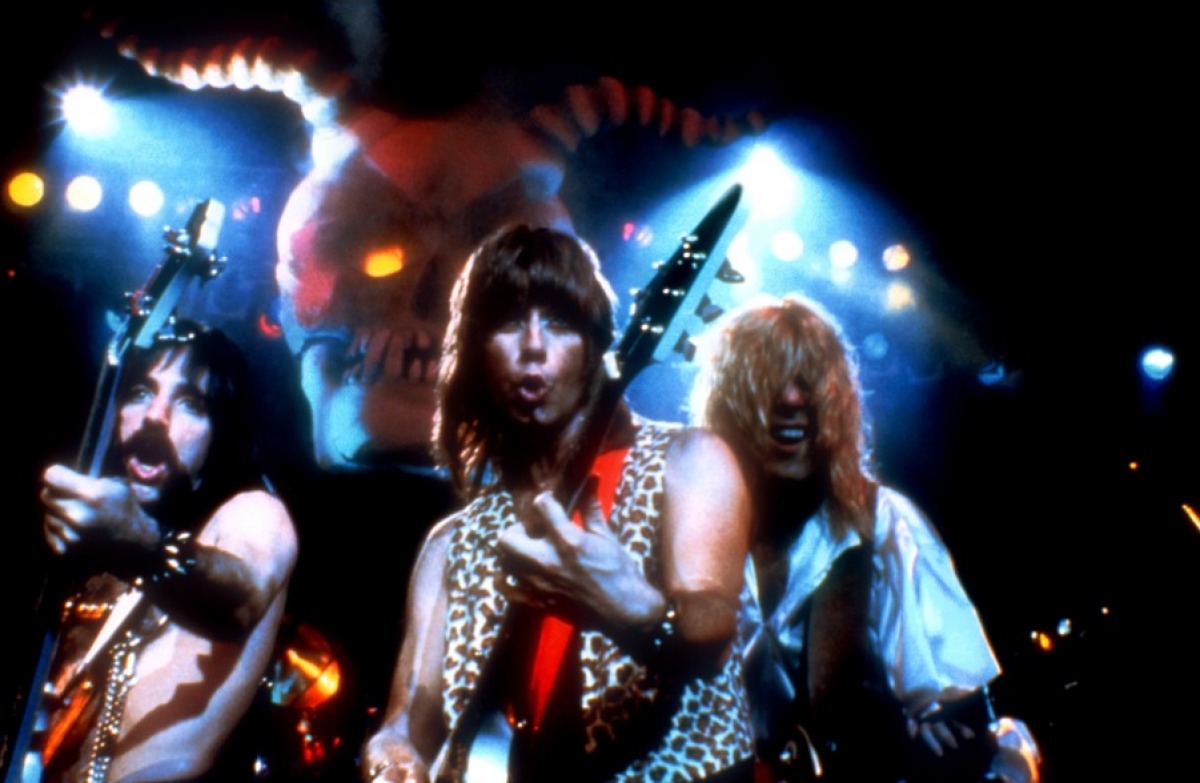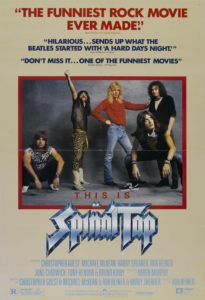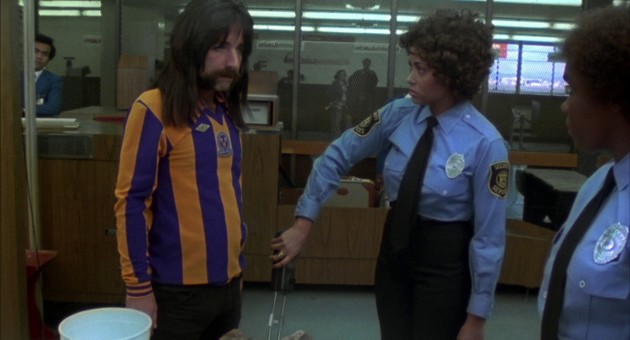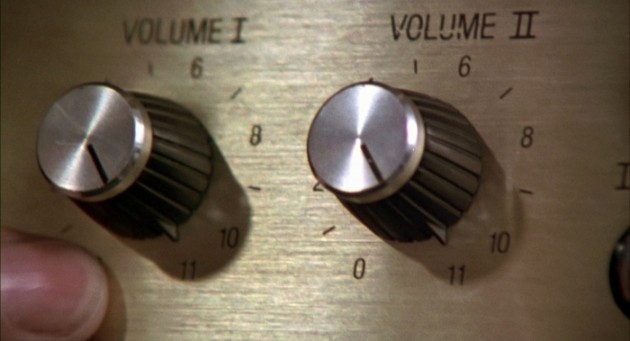Welcome back to 80s Bits, the weekly column in which we explore the best and worst of the Decade of Shame. With guest writers, hidden gems and more, it’s truly, truly, truly outrageous. This week’s guest writer is Susan Mills.
[stextbox id=”grey” caption=”This Is Spinal Tap (1984)” float=”true” align=”right” width=”200″]
Director: Rob Reiner
Writers(s): Christopher Guest, Michael McKean, Harry Shearer, Rob Reiner
Runtime: 82 minutes
Starring: Christopher Guest, Michael McKean, Harry Shearer, Rob Reiner, Fran Drescher, Bruno Kirby
Distributor: Embassy Pictures, Studio Canal
Country: US
Rating: Certified Bitstastic (★★★★★) (?)
[/stextbox]
The year is 1982, and a band of British ageing heavy metal rockers set out on a concert tour across the US for their new album Smell the Glove. This is Spinal Tap. That is, Spinal Tap is the name of the band.
37 people have been in the band Spinal Tap throughout its history, including a string of drummers who have all met a mysterious demise. However, the band revolves around the three core members: David St Hubbins (Michael McKean) on main vocals and rhythm guitar! Nigel Tufnel (Christopher Guest) on lead guitar! And Derek Smalls (Harry Shearer) on bass!
This is Spınal Tap is a rockumentary/mockumentary. We follow filmmaker Marty DiBergi (Rob Reiner) as he spends time with the band on the road. The Smell the Glove tour kicks off with an opening night party in New York, where Fran Drescher does a turn as a record company flaky rocking some serious 80s makeup, and Billy Crystal has a very brief role as a mime-waiter, memorable for the line “mime is money!”. Intercutting tour and concert footage with interviews, we are taken through an increasingly shambolic tour to its end. But as David St Hubbins himself philosophises while getting zen about such endings: “What’s the end…is my question to you.” So true, David, so true.
Ian Faith (Tony Hendra) is their tired manager who finds a cricket bat is the best accessory for such a job, and David’s mystically obsessed girlfriend Jeanine (June Chadwick) causes trouble, seemingly modelled on that mythical Ono/Spungen archetype.
The band sport 80s rock hair and bold eye makeup, and there are crotch shots aplenty in tight luridly coloured lycra and diva angst over backstage riders. There are cancelled shows, disappointing fan events, including a record signing nobody attends, a threatened boycott of Smell the Glove’s sexist cover art, and hotel booking mix ups (“How are we going to get 14 people in a king leisure bed?”). There are grand quittings: Ian quits when Jeanine becomes co-manager, refusing to co-manage with someone who looks like “an Australian’s nightmare”, and Nigel quits the band on stage during an ill-booked Airforce base ‘monthly at ease weekend’ gig, featuring a hilariously unwitting Lt. Hoekstratton (Fred Willard).
Inspired by a 1979 comedy sketch by Rob Reiner, This is Spinal Tap was released in 1984 and was not a box office success but has since become something better, a cult classic. The film was directed and written by Rob Reiner. Christopher Guest and Michael McKean are also billed as writers as much of their dialogue is ad-libbed.
The band successfully play on stereotypes of 80s heavy metal. There is a ‘metal umlaut’ over the ‘n’ in Spinal Tap, and they are at least as hard rock as Guns N’ Roses and Motley Crue. Their album titles parody metal bands striving for shock value, such as Intravenus de Milo, and Shark Sandwich. Their latest album, Smell the Glove, features such songs as Big Bottom, Nice ‘n’ Stinky, Tonight I’m Gonna Rock You Tonight, and Sex Farm, the latter praised by Derek Smalls for encapsulating Spinal Tap’s sophisticated approach. Many songs are lovingly played in concert footage throughout the film, with plenty of heavy metal sticking-out-of-tongue action (if that’s a term).
Yes, the band are sexist and not very smart, but the film is not offensive as we can laugh at them. This is after all a satire. Just to be clear, although much of the band really do play their instruments and sing, this is not a real band and not a real documentary. On its release there were many who thought it was real, possibly due to the effect of the ad libbing which never misses a beat, but also that the look and feel of 80s hair metal bands are all there, so ludicrously self-important and full of the myopia of the music industry, so real as to be so funny.
A lot of the humour in This is Spinal Tap comes from the delivery of the dialogue in deadpan faux English accents, rendering lines with a wide-eyed sincerity in a juxtaposition that creates hilarity. There’s inane tour conversation: “what’s the difference between golf and miniature golf …the ball is smaller?” Deep thoughts from Derek, as he realises he is the “lukewarm water” to David and Nigel’s fire and ice. Heavy vibes from David as he declares there is just “too much perspective” when visiting Elvis’ grave. The infamous line from Jeanine when she says: “you don’t do heavy metal in Dubly”, making many a fan mispronounce Dolby forever. It’s also a challenge for anyone not to laugh as David deadpans about the fate of yet another Spinal Tap drummer: “dozens of people spontaneously combust each year, it’s just not widely reported.”
Many phrases have entered common usage, proving the influence of this film. Maybe none more so than ‘up to eleven’, as Nigel proudly shows Marty his amp with the sound numbers that go up to eleven, explaining significantly “it’s one louder” than ten. Marty replies confusedly “why don’t you just make ten louder?” And who could forget the band getting lost in the hallways to the stage, yelling “rock and roll!” and “Hello Cleveland!”
The ideas the band come up with to prove their rockness also provide much of the comedy gold. Due to a mix up in a hastily scribbled design on a napkin, an 18 inch Stonehenge prop, instead of 18 foot, is unveiled on stage. The resulting argument is one of the best scenes in the film, as David cries “I think the problem may have been that there was a Stonehenge monument on the stage that was in danger of being crushed by a dwarf. That tended to understate the hugeness of the object“ and defends Nigel’s design mistake to Ian: “it’s not your job to be as confused as Nigel!”
Derek Smalls is a quiet achiever of this film. Not given as much screen time or dialogue as the main two band members, he has his own moments to shine: his double-armed bass, desperately trying to free himself from being trapped in an egg/cocoon stage prop, and of course being caught out by the metal detector at the airport with an aluminium covered cucumber. Will Derek ever get the time he needs to start his dream project, ‘Saucy Jack’, a rock opera based on the life of Jack the Ripper?
It’s not all rock and roll though, as the relationship between David and Nigel provides some actual touching moments, and creates a tension with Jeanine as a sort of love triangle. David and Nigel met when they were small kids, and Nigel explains that they are closer than brothers. After Nigel’s departure, David seems calm but explains: “I’m sure I’d feel much worse if I weren’t under such heavy sedation”, belying his deep affection for his rock buddy.
This is Spinal Tap has held up well, despite hair bands being succeeded by pop, boy bands, rap, grunge, R&B genres in mainstream popularity. The main themes of musicians and record companies taking the game too seriously and trying to manufacture success still rings true. The mockumentary as commentary on the documentary art form is another reading. Or maybe it’s still good viewing because it’s just so silly it’s fun.
Undoubtedly This is Spinal Tap could be seen to have influenced a plethora of mockumenteries to follow, such as hip hop parody Fear of a Black Hat (1994) and Get Ready to be Boyzvoiced (2000) about fictional Norwegian boy band Boyzvoice. And of course Christopher Guest and Michael McKean have gone on to more mockumentary success, with Waiting for Guffman (1997), Best in Show (2000), and A Mighty Wind (2003) all directed, co-written and acted in by Christopher Guest with the latter two also featuring Michael McKean.
It’s wonderful that humans have the capacity to laugh at who we are. I’m looking forward to a mockumentary about bloggers. In the meantime, as one of Spinal Tap’s keyboardists says “Have a good time, all the time”. Or perhaps David St Hubbins best sums it up when he says if couldn’t be a rock and roller he’d be a full time dreamer. Wouldn’t we all, David, wouldn’t we all.







